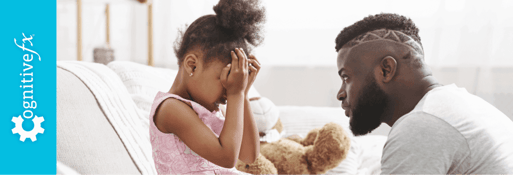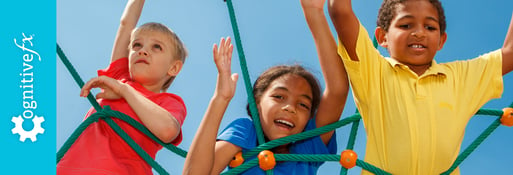Parents who support their children recovering from post-concussion syndrome or symptoms (PCS) are in challenging circumstances. Many times parents and their injured child, are not fully supported throughout recovery. Often they are left with unanswered questions, and they are left searching and seeking resources to help them to help their child. We have asked parents of our patients, and parents of those who take care of individuals with PCS for things that would help others in their journey and this is what we gathered.
The Recovery Rollercoaster
We know this process can be frustrating, overwhelming, and it is a roller coaster of emotions for all involved. Throughout this process, you may experience feelings of frustration, empathy, and in some cases even heartache, hopelessness, and fear. It’s hard to watch your child suffer and feel you can’t do anything about it.
As a parent, it is essential to know that symptoms can evolve and get worse over time. When you document and log their feelings and emotions, along with your own emotions, it can help you better understand what is happening.
As they struggle in their process of recovery, your child may have personality changes, act out, or get angry quickly. Eating and sleeping habits can change. Your child may have chronic headaches or pain. Your child is scared. They may even talk about dying or giving up, and we know that it is hard to hear, and hard to understand what to do. You may wish that you could take away all of the struggles and challenges. We know that this journey is not easy.
A concussion or brain injury can impact everyone involved and their quality of life. Give yourself space to feel what you need too. To grieve, to adjust, and adapt.
Have Resilience & Patience
Recovery takes time and patience. It is not a one size fits all recovery, which requires resilience. Resilience means taking things one day at a time, and every time it feels like you are knocked down, or your child is knocked down you get up, and then you help them get up too. Being persistent, and continuing to press forward even when it seems as if all odds are against you will help you and your child to progress throughout your recovery.
Things that encourage resilience may include:
Using Self-Calming Techniques
Help the person with the injury to learn new self-calming techniques like mindfulness, deep breathing, and other activities that help them manage their current state of life. Give them a safe place to calm down, let them calm down at their own pace. If something is going on you don't understand, avoid engaging in arguments.
Recognize Behavior & Personality Changes May Come from the Injury
Recognize some of their behavior changes are due to the concussion, and changes in the way their brain functions this is not choice. You may learn not to expect logical behavior, in the beginning. Try to see things through your child’s eyes. It will help your relationship. Work to develop a new love and respect for this new person.
Ask for Help & Get Support
Because of an injury, it can be hard to process emotions, and to sort out what is happening, not only for the person who is injured but even for those who are close to them. Parents can feel like they’re going crazy and no one else gets it. During this time it is vital that you have support and someone you can talk to, and find support for your child or teen.
If you are feeling lost, confused, and don’t know where to turn, don’t give up. There are many support groups for caregiver’s and other parents who are facing similar challenges. Talking about how challenging this is and that you need support, only shows how much you care. You can also ask for help in taking care of your child and supporting your child. You do not have to be the sole person to support them.
Many times we as humans are afraid to ask for support, but we are not meant to face things alone. Just like your child cannot meet their injury alone, you cannot face the impact this injury has on your life alone.
Encourage One Another
Learning to encourage and uplift one another during the hard times, makes a huge difference. Instill in your child a sense of humor about the learning and growing. Don’t look at setbacks as a failure instead recognize it is all part of the process, and that is encouraging.
Anything that is an indication of challenge and growth is a sign of improvement. Recovering from a brain injury takes courage, and encouragement. When you say “You can do it!” to your child, it helps them to believe in themselves and just how far they can go. In turn, your child may start saying to you that “You can do it!”
Maintain Accountability & Responsibility
We know it can be hard to watch someone you love struggle or do things that may seem impossible for them. We know it is tempting to do things for your child because you love them, but it can be to their detriment and will establish an unhealthy codependent relationship.
The best way you can support your injured teen is to support them and love them, but do not do everything for them. The end goal is always that your child will be self-sufficient and able to handle their challenges in a healthy way. They still need accountability and responsibility in their daily routine and throughout their recovery.
Overall, we know that this journey and recovery is by no means easy or straightforward. We want to acknowledge you for taking care of the person you love. We want to thank you for not giving up on them for believing in them, and for caring enough about them to do what it takes to keep going every day, even when it seems like there is no light at the end of the tunnel.
Quite frankly, we know that for many of our patients they would have given up much sooner if they didn't have the support and care from a loved one. We hope that you can see just how vital your role is in their recovery and that every small win is a huge win. Because a big win is made up of a collection of small choices, and small actions, choices, and actions that you contribute to. Thank you for being there for those you love, particularly your children.









